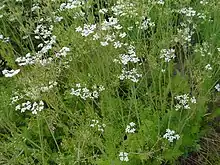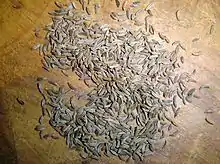caraway
See also: Caraway
English

caraway, habitat

caraway seeds
Etymology
From Middle English caraway, carewey, carwey, from Medieval Latin carui, from Arabic كَرَاوِيَا (karāwiyā), via Aramaic from Ancient Greek καρώ (karṓ), κάρον (káron, “caraway”).
Pronunciation
- (Received Pronunciation) IPA(key): /ˈkæɹəˌweɪ/
- (General American) IPA(key): /ˈkæɹəˌweɪ/, /ˈkɛɹəˌweɪ/
Audio (Southern England) (file)
Noun
caraway (countable and uncountable, plural caraways)
- A biennial plant, Carum carvi, native to Europe and Asia, mainly grown for its seed to be used as a culinary spice.
- The seed-like fruit of the caraway plant.
- A cake or sweetmeat containing caraway seeds.
- 1897, Imogen Clark, Will Shakespeare's Little Lad:
- I'll eat her marchpane and her caraways
- 1916, The Country Gentleman:
- the housewife of today can surely match the skill of those of three centuries ago and make "caraways” or cheesecakes
Synonyms
Derived terms
Translations
plant
|
seed/fruit
|
Further reading
 caraway on Wikipedia.Wikipedia
caraway on Wikipedia.Wikipedia - “caraway”, in Dictionary.com Unabridged, Dictionary.com, LLC, 1995–present.
- “caraway”, in Merriam-Webster Online Dictionary, Springfield, Mass.: Merriam-Webster, 1996–present.
Middle English
Alternative forms
Etymology
From Medieval Latin carui, from Arabic كَرَاوِيَّا (karāwiyyā), via Aramaic from Ancient Greek καρώ (karṓ), κάρον (káron, “caraway”). Doublet of carvi.
Pronunciation
- IPA(key): /ˈkarwiː/, /ˈkarəˌwiː/, /-wɛi̯/
Descendants
- English: caraway
References
- “carewei, n.”, in MED Online, Ann Arbor, Mich.: University of Michigan, 2007, retrieved 2019-04-26.
This article is issued from Wiktionary. The text is licensed under Creative Commons - Attribution - Sharealike. Additional terms may apply for the media files.